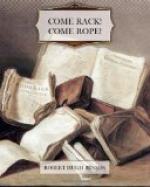Now Anthony Babington was one of those spirits that live largely within themselves, and therefore see that which is without through a haze or mist of their own moods. He read much in the poets; you would say that Vergil and Ovid, as well as the poets of his own day, were his friends; he lived within, surrounded by his own images, and therefore he loved and hated with ten times the ardour of a common man. He was furious for the Old Faith, furious against the new; he dreamed of wars and gallantry and splendour; you could see it even in his dress, in his furred doublet, the embroideries at his throat, his silver-hilted rapier, as well as in his port and countenance: and the burning heart of all his images, the mirror on earth of Mary in heaven, the emblem of his piety, the mistress of his dreams—she who embodied for him what the courtiers in London protested that Elizabeth embodied for them—the pearl of great price, the one among ten thousand—this, for him, was Mary Stuart, Queen of Scotland, now prisoner in her cousin’s hands, going to and fro from house to house, with a guard about her, yet with all the seeming of liberty and none of its reality....
The rough bitterness died out of the boy’s face, and a look came upon it as of one who sees a vision.
“Queen Mary?” he said, as if he pronounced the name of the Mother of God. “Yes; I have heard of her.... She is in Norfolk, I think.”
Then he let flow out of him the stream that always ran in his heart like sorrowful music ever since the day when first, as a page, in my Lord Shrewsbury’s house in Sheffield, he had set eyes on that queen of sorrows. Then, again, upon the occasion of his journey to Paris, he had met with Mr. Morgan, her servant, and the Bishop of Glasgow, her friend, whose talk had excited and inspired him. He had learned from them something more of her glories and beauties, and remembering what he had seen of her, adored her the more. He leaned back now, shading his eyes from the candles upon the table, and began to sing his love and his queen. He told of new insults that had been put upon her, new deprivations of what was left to her of liberty; he did not speak now of Elizabeth by name, since a fountain, even of talk, should not give out at once sweet water and bitter; but he spoke of the day when Mary should come herself to the throne of England, and take that which was already hers; when the night should roll away, and the morning-star arise; and the Faith should come again like the flowing tide, and all things be again as they had been from the beginning. It was rank treason that he talked, such as would have brought him to Tyburn if it had been spoken in London in indiscreet company; it was that treason which her Grace herself had made possible by her faithlessness to God and man; such treason as God Himself must have mercy upon, since He reads all hearts and their intentions. The others kept silence.
At the end he stood up. Then he stooped for his boots.




